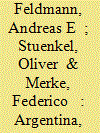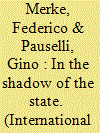|
|
|
Sort Order |
|
|
|
Items / Page
|
|
|
|
|
|
|
| Srl | Item |
| 1 |
ID:
165050


|
|
|
|
|
| Summary/Abstract |
This article examines the role of Argentina, Brazil and Chile (the ‘ABC countries’) in supporting democracy through the logic of consequences and appropriateness in three emblematic cases: the removal of President Zelaya in Honduras in 2009, the constitutional crisis that led to the removal of President Fernando Lugo in Paraguay 2012 and the sudden closing of the National Assembly in Venezuela in 2017. The authors argue that the ABC governments’ responses to governance crises have been shaped by a mixture of motivations, both instrumental (geopolitical interest or ideological affinity) and ideational (a normative preference for democracy). This mixture has resulted in inconsistent policies deriving from the mismatch between the normative commitments made by these countries, enshrined in multilateral instruments such as democracy clauses, which have often limited their room for manoeuvre, and their preference for a measured, prudent foreign policy based upon traditional principles of non-intervention. Specifically, the authors find that the ABC countries’ stance on democracy support depends on two fundamental conditions: their leverage vis-à-vis the target state and the degree of certainty regarding a potential resolution of a given democratic crisis.
|
|
|
|
|
|
|
|
|
|
|
|
|
|
|
|
| 2 |
ID:
142223


|
|
|
|
|
| Summary/Abstract |
This paper analyzes the role of think tanks as members of civil society in Latin America. Our goal is to present an initial conceptualization and measurement of the role think tanks play in the foreign policy sub-subsystem. We focus on three of the most influential think tanks in the region: CARI (Argentina), CEBRI (Brazil), and COMEXI (Mexico). This paper suggests that the state’s characteristics and the character of its civil society determine the type and strength of its think tanks. This paper also considers the challenges that think tanks face in Argentina, Brazil, and Mexico more generally by comparing each chosen think tank’s board, public activities, presence in local media and social media, and publications. We conclude that there have yet to be significant incentives and resources available for thinks tanks in Argentina, Brazil, and Mexico to grow and, thus, Latin American think tanks’ activities typically follow their governments’ agendas.
|
|
|
|
|
|
|
|
|
|
|
|
|
|
|
|
|
|
|
|
|